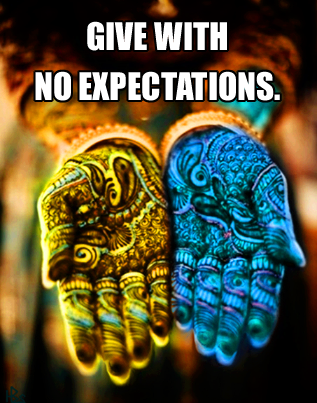
We all need a helping hand at one time or another, but a light touch is required to keep good intentions from backfiring. Recent psychological studies confirm ancient teachings about the wisdom of being subtle when we try to assist others.
“When no credit is taken, accomplishment endures.” Lao Tzu, the sixth century Chinese philosopher who wrote the Tao Te Ching, was onto something. It often happens that the greatest praise we can receive for our good intentions is when those we help think they did it themselves. Otherwise, competition and clashing egos can undermine any project. It took Al Gore years to live down the jokes about him inventing the Internet even though he never exactly said that. It makes me wonder if we all would be shivering in the cold and unable to travel long distances if anyone suspected someone else might be trying to get a patent on fire or the wheel.
While much of today’s research on supporting others focuses on parents and spouses, it is reasonable to assume that the findings can be applied to any relationship. In 2011, one study found that thinking about support from a significant other tended to make people procrastinate and decreased their motivation to work toward their goals. In an online experiment, women were divided into two groups. One group was asked to think about how their partner helped them to reach their health and fitness goals. It turned out those women planned to put forth less effort in that area compared to the group who were asked to think about their partner’s support regarding career goals. The topic of support seems to matter.
Of course, giving and receiving support and guidance is still a key element in any healthy relationship. It gives us the opportunity to feel connected, build trust and experience personal growth. The bottom line is to keep in mind the common obstacles that may arise, and apply solutions. We need to start with an open mind so we can determine if the other person really requires our help.
Listen with the intent to understand. This means listening carefully and objectively to what they have to say. It may very well be that your friend, spouse, or child simply wants to vent about an unpleasant situation without being told how to solve it. Sometimes being present and letting them know you are there is enough.
Give without expectations. Let the joy of sharing our time and insight act as its own reward. It is unrealistic to expect reciprocity in every situation. Giving unconditionally reduces the risk that we will be disappointed. Besides, others are likely to respond better if they feel your kindness is unconditional.
View relationships in their totality. Recognize how people indirectly enable us to reach our goals. Maybe we get a report written in time for a noon deadline thanks to the colleague who covered our calls that morning. Indirectly supporting others can help them ‘breathe’ a little easier during troubled times.
Help others without creating disincentives. By limiting our actions to filling in “the gaps”, we allow others to resolve their own troubles, remain strong, and be accountable for their own growth and learning.
While we adjust our approach, we also need to consider that the passage of time creates its own effects. A Stanford University business professor documented what we all may have suspected. As time goes by, the receivers of favors value them less while the givers value them more. A survey of workers in the Customer Services department of a major airline found that their gratitude was highest immediately after another worker covered their shift. When the same workers covered someone else’s shift, they valued their favor more highly the more time elapsed. While this may sound like bad news if we were hoping to get paid back, we can also learn to accept and benefit from the reality of the situation. When we devote our efforts to helping others for their sake, we are likely to value our investment all the more in days and years to come.
Remaining behind the scenes may be the best position when it comes to helping others most effectively. By limiting our actions as we gently support others with our kindness, we may just be offering the best guidance of all.







